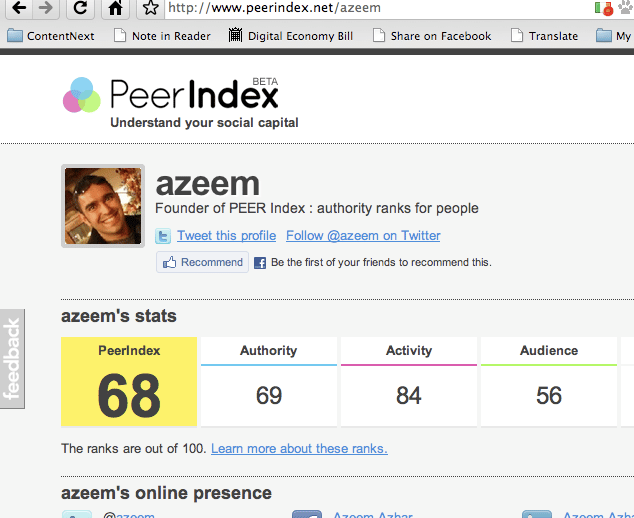
Digital investor and former Reuters (NYSE: TRI) innovation head Azeem Azhar has shuttered his recently-launched Viewsflow site for identifying the most insightful news commentary, but fed the learnings in to PeerIndex, a service which attempts to rank people according to their authority on subjects.
PeerIndex crawls commentators’ and writers’ social profiles and websites, then deploys algorithms — for example, considering how many peers agree with a commentator — to determine their authority on a subject.
The public site includes a free-to-view index of authority around some key topics, but Azhar tells paidContent:UK the idea is to sell a premium service, offering deeper, custom categories, to brand marketing and communications professionals, so they can figure out which influencers their client should be dealing with. He claims several such, unnamed companies are clients already.
Viewsflow/PeerIndex claims former Economist editor-in-chief Bill Emmott, ex Raw Communications CEO Ab Banerjee, angels Sherry Coutu and angel Stefan Glaenzer, and Wesley Clover CEO Simon Gibson as early investors, plus the Nauiokas Park investment house.
The site looks beautiful, but understanding what the numbers mean, and how that should translate to actions brands should take, seems complex.
And the authority index itself may not be perfect right now. For example, the list of authorities on Apple recommends a Portuguese Air Force e-learning evangeliser, and I am ranked in the top 10 percent of worldwide Apple (NSDQ: AAPL) authorities – but, for example, CultOfMac publisher Leander Kahney, who has written three books on Steve Jobs’ company, is nowhere to be found.
“People are finding it hard to reach smart people,” Azhar tells paidContent:UK. “There’s an immediate customer problem around discoverability.”
Azhar says the site has something of a “speakers’ bureau role”, making connections between influencers and brands. But, for now, the platform does not facilitate the actual dialogue between those parties, which would instead happen via their social networks.
Like last week’s Flipboard iPad “magazine”, PeerIndex seems to work to the notion that publicly-shared sentiment can be valuable in presenting readers accurate information.